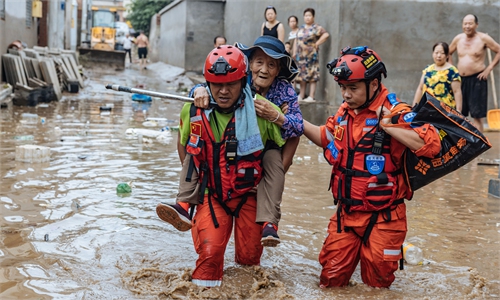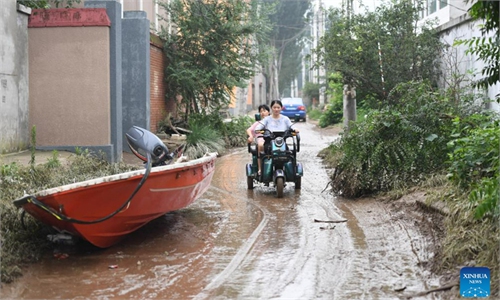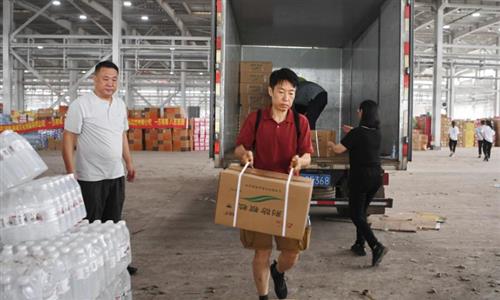IN-DEPTH / IN-DEPTH
Witness to history: Resilience and selflessness radiate amid a once-in-a-century deluge, as rescue and reconstruction work continues
Valor in the rain
Editor's Note:
In recent days, the Beijing-Tianjin-Hebei region among other areas in northern China have been hit by heavy rain. More than 130,000 people have been affected in the hardest-hit city of Zhuozhou, Hebei Province, with 146 villages and communities impacted, covering an area of 225.38 square kilometers. A total of 57 relocation sites have been established.
In the midst of the catastrophic downpour leading to severe flooding, the Chinese central and local governments, grassroots officials, the People's Liberation Army (PLA) soldiers, civilian rescue teams, and volunteer groups from all walks of life have taken actions and played heroic roles in the face of the disaster.
Global Times reporters visited some of the affected communities and villages in Fangshan district, Beijing, and Zhuozhou city in Hebei Province and talked with witnesses to the once-in-a-century torrential rainfall to learn about the resilience and selflessness of Chinese people amid the disaster.
This story is a part of the Global Times' series of "Witness to history," which features first-hand accounts from witnesses who were at the forefront of historic moments. From scholars, politicians and diplomats, to ordinary citizens, their authentic reflections on the impact of historic moments help reveal a sound future for humanity through the solid steps taken in the past and the present.
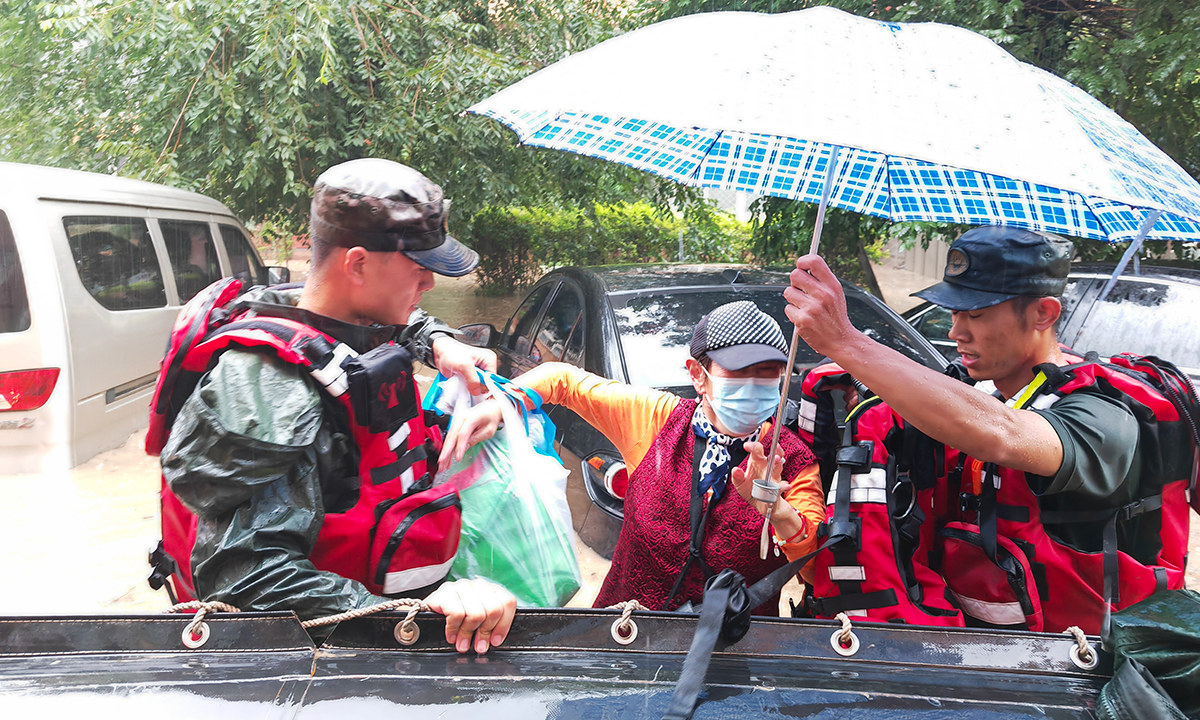
The sun beats down and the roads bustle with traffic. It was a typical summer weekend in the city of Beijing, seemingly untouched by the rare torrential rain that struck the capital.
However, in the outskirts, particularly in the western suburbs of the capital city as well as neighboring areas of Hebei Province, the aftermath of the disaster still lingers, and the memories of its perils and losses remain vivid.
Amidst the merciless deluge, a stark contrast emerges - the radiant spirit of humanity. Those who shield the frightened souls from the relentless torrents, their stories unfold before us, or are being recounted by the very people they have touched.
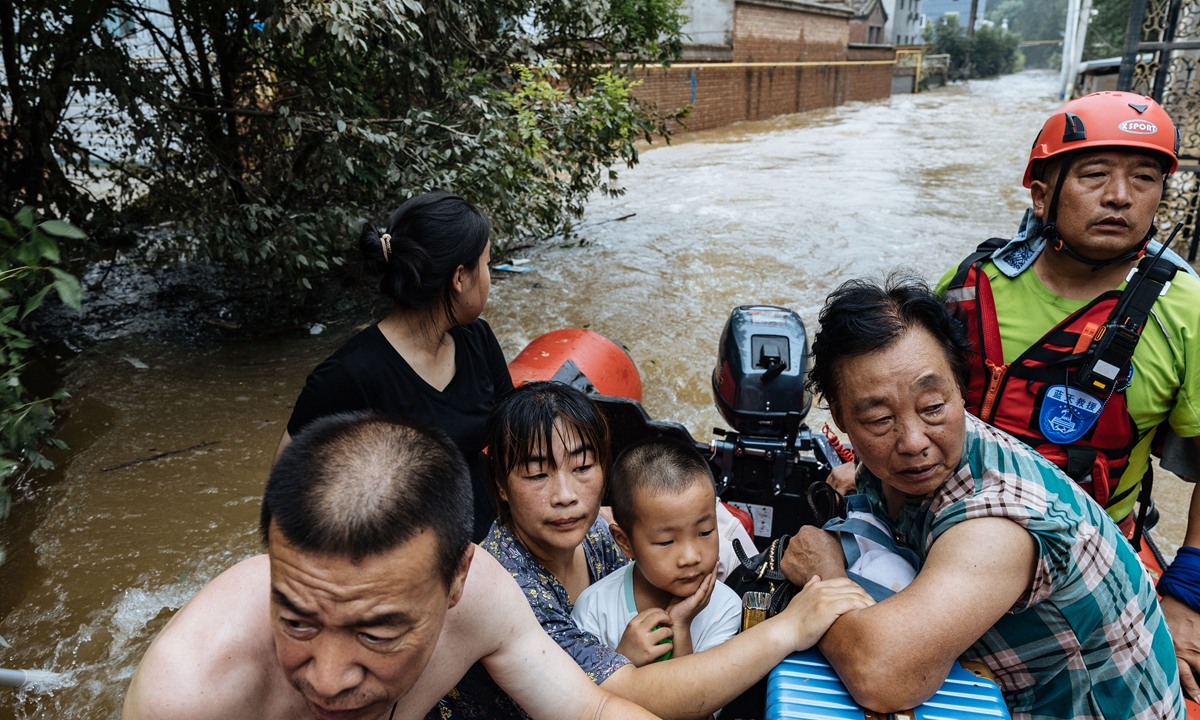
Mighty decision
Luo Jianqing had never anticipated patrolling the village in this manner.
Seated at the rear end of a rubber raft and clad in a life jacket, he pointed out potential collisions with the walls of courtyards submerged by the muddy floodwaters - the walls now concealed beneath the murky deluge, like hidden reefs in an ocean.
At 58, Luojian is the Party secretary of Huangjiajie village in Matou town, Zhuozhou city. During the SARS outbreak in 2003, his dedicated service led him to join the Party on the frontlines.
Although located just a street away from Beijing's Fangshan district, Huangjiajie village found itself inundated after the once-in-a-century torrential downpour led to flooding of the Juma River due to its location in the flood-prone area.
"We received early notifications and evacuated villagers living in low-flung areas, as well as the elderly and children from the village," Luo told the Global Times. "On August 1, it took five to six hours for the water to rise."
In Huangjiajie village, the floodwaters reached depths of over 5 meters. Some villagers' second floors were submerged, puffed snacks from a small flooded supermarket floated on rooftops, and only the tops of road signs were visible. Two vigilant guard dogs stood atop courtyard walls, barking at passing boats.
However, not all residents of the village were evacuated. Those living on higher ground decided to stay, their homes turning into isolated islands in the floodwaters.
Luo led reporters to view the Juma River course. What used to be a mere 200- to 300-meter-wide channel had expanded to a kilometer's width. "It submerged the farmers' fields, causing immeasurable losses," Luo explained.
"No one expected the flooding to be this severe, not even during the 7/21 heavy rainfall event when our village was not significantly affected," Luo said, referring to the strong rainfall in Beijing in July 2012, which led to multiple casualties.
Upon witnessing this situation, Luo decided to procure supplies and search for rescue teams by posting his willingness to help on WeChat.
On August 3, when the Global Times reporters visited Huangjiajie village, it was submerged under floodwaters, without water or electricity, with water levels rising as high as the first floors of buildings and courtyard walls. Two civilian rescue teams were in operation, aiding in the transportation of supplies and assisting villagers in need. That afternoon, the Global Times reporters observed the arrival of three batches of supplies donated by the township government, local enterprises, and villagers living elsewhere, which included bottled water, instant noodles, milk, and canned congee.
During that day's rounds, Luo was continually hailed by stranded villagers. Among them was villager Li Baogang, who was almost fully submerged under water, with only his head being visible, and was preparing to swim to the village entrance that was not submerged to seek help.
"There are 17 people living in my house now," Li shouted to Luo. As his house was located at a relatively higher elevation, Li had taken in several neighboring households. "We still need some food and water."
"I'll have it brought to you shortly," Luo promised hoarsely to Li, who swam back to house afterward.
Not far along, Luo was hailed by another stranded villager, who informed him of the arrival of a fresh batch of rescue supplies.
"I do not know how many days it will take for the floodwaters to recede," Luo told the Global Times. "But this is just the beginning. I have already ordered disinfection supplies, as the next focus after the flood is sterilization and hygiene."
More than 130,000 people have been affected in Zhuozhou, with 146 villages and communities impacted, covering an area of 225.38 square kilometers. A total of 57 relocation sites have been established as of press time.
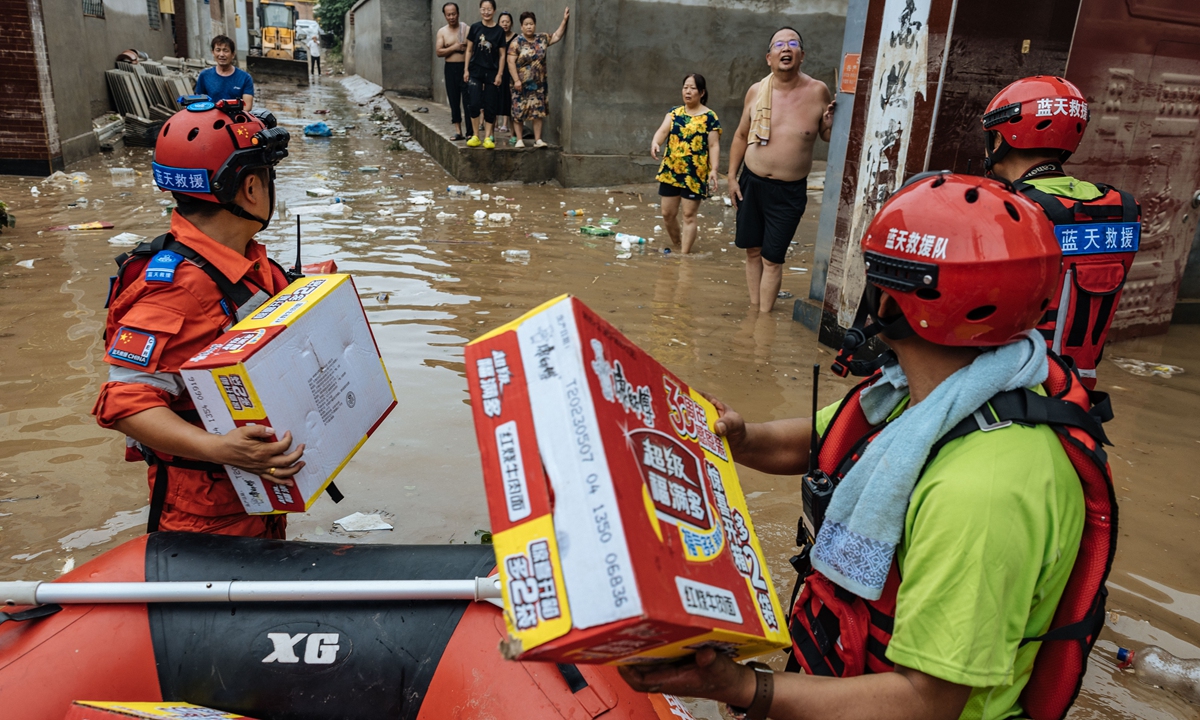
United as one
Back along Beijing's borders, just a 15-minute drive from Huangjiajie village, the township of Liulihe in Fangshan district suffered severe damage. Roads surrounding certain villages were submerged, while water and electricity supplies were cut off, turning communities into isolated islands.
On Thursday, the Global Times reporters encountered a detachment from the First Mobile Contingent of the PLA Armed Police Force actively engaged in rescue operations. Since the early hours of July 31, this PLA Armed Police Force had dispatched 54 personnel and 15 rescue vehicles, immediately embarking on missions such as missing person searches and rescue and material evacuation.
That very evening, the dispatched troop of soldiers rescued over 20 senior citizens who had been trapped in a local Songhe Elderly Care Home. "At the time, the water was around 3 meters deep, and covered a distance of over 400 meters to reach the care home. Ultimately, we successfully handed the senior citizens over to the district government and they were evacuated to safety," a military officer recounted to the Global Times.
Over the last few days, the troop set up camp in a cement factory complex in Liulihe, where the factory provided them with accommodation and meals.
The arrival of the armed police brought great relief to local residents. They were ferried through deep waters using the army's rubber boats or amphibious buses, being evacuated from the stranded villages, or entering villages to reunite family members.
Battles against natural disasters like these are never won through the efforts of a single unit alone.
From August 1 to 2, within a span of almost 24 hours, the small town of Zhuozhou saw an influx of nearly 17,000 mobile phone signals from outside the area. Notably, almost 10,000 individuals arrived from other provinces to Zhuozhou during this time, CCTV reported.
In Huangjiajie village, assistance came from the Yinchuan Blue Sky Emergency Rescue Center and the Wuzhong Blue Sky Rescue Team from Northwest China's Ningxia Hui Autonomous Region, along with volunteers from the Truck Association of Liulin county in North China's Shanxi Province.
The volunteers drove for more than 10 hours, bringing along their own professional rescue equipment, including boats and voluntarily joined the efforts.
"When I saw the rescue team arrive here, tears welled up in my eyes," said Luo, Huangjia Street Village head. "They brought us hope and courage to conquer the disaster," he said.
Not far from Huangjiajie village, in Mengjiajie village in Zhuozhou, a team of 13 volunteers from the Volunteer Federation Blue Sky Rescue Team of Pingdingshan city, Central China's Henan Province, arrived with three boats for rescue operations.
"As we were leaving the highway, we encountered a volunteer truck driver transporting donated supplies. They also came here with us," Shi Lei, a member of the Blue Sky Rescue Team and a coal mine worker by profession, told the Global Times.
During the Thursday interview, the rescue team from Pingdingshan saved an elderly man who had suffered a head injury and two feverish children from the village, while delivering numerous bottles of water and instant noodles by boat to the stranded villagers.
Trucks filled with disaster relief supplies from all corners of China, and strangers turned volunteers, all contributed their strength to help this small city to overcome its challenges.
The Blue Sky Rescue Team alone dispatched 106 rescue teams, 191 vehicles, 848 personnel, and 125 boats from 11 provinces to conduct rescue operations in the disaster-stricken area.
During the rescue operations on July 31, two members of the Fangshan Blue Sky Rescue Team, Wang Hongchun and Liu Jianmin, tragically lost their lives after being swept away by floodwaters.
Through the efforts of all parties involved, on Sunday, some residents from disaster-stricken areas in Beijing were transported home from relocation sites. However, officials have cautioned that in mountainous areas, emergency relief efforts are still underway, and there remains a significant risk of geological disasters and adverse weather conditions. Residents have also been advised to avoid traveling to these areas.
Meanwhile, as of Sunday noon, the main urban area of Zhuozhou city in Hebei Province saw floodwaters recede significantly, and a slow but steady return to normalcy for residents.
Efforts are now underway to swiftly clear silt and debris, and restore water, electricity, and communication services, while work to resettle evacuees back to their homes is underway.
In recent days, the Beijing-Tianjin-Hebei region among other areas in northern China have been hit by heavy rain. More than 130,000 people have been affected in the hardest-hit city of Zhuozhou, Hebei Province, with 146 villages and communities impacted, covering an area of 225.38 square kilometers. A total of 57 relocation sites have been established.
In the midst of the catastrophic downpour leading to severe flooding, the Chinese central and local governments, grassroots officials, the People's Liberation Army (PLA) soldiers, civilian rescue teams, and volunteer groups from all walks of life have taken actions and played heroic roles in the face of the disaster.
Global Times reporters visited some of the affected communities and villages in Fangshan district, Beijing, and Zhuozhou city in Hebei Province and talked with witnesses to the once-in-a-century torrential rainfall to learn about the resilience and selflessness of Chinese people amid the disaster.
This story is a part of the Global Times' series of "Witness to history," which features first-hand accounts from witnesses who were at the forefront of historic moments. From scholars, politicians and diplomats, to ordinary citizens, their authentic reflections on the impact of historic moments help reveal a sound future for humanity through the solid steps taken in the past and the present.

Soldiers from PLA Armed Police Force help transfer seniors from Songhe Elderly Care Home on August 2, 2023 in Liulihe town, Fangshan district in Beijing. Photo: Courtesy of First Mobile Contingent of the PLA Armed Police Force
The sun beats down and the roads bustle with traffic. It was a typical summer weekend in the city of Beijing, seemingly untouched by the rare torrential rain that struck the capital.
However, in the outskirts, particularly in the western suburbs of the capital city as well as neighboring areas of Hebei Province, the aftermath of the disaster still lingers, and the memories of its perils and losses remain vivid.
Amidst the merciless deluge, a stark contrast emerges - the radiant spirit of humanity. Those who shield the frightened souls from the relentless torrents, their stories unfold before us, or are being recounted by the very people they have touched.

Residents are evacuated from a village by a volunteer rescue team, in Mengjiajie village, Zhuozhou city, North China's Hebei Province, on August 3, 2023. Photo: Li Hao/GT
Mighty decision
Luo Jianqing had never anticipated patrolling the village in this manner.
Seated at the rear end of a rubber raft and clad in a life jacket, he pointed out potential collisions with the walls of courtyards submerged by the muddy floodwaters - the walls now concealed beneath the murky deluge, like hidden reefs in an ocean.
At 58, Luojian is the Party secretary of Huangjiajie village in Matou town, Zhuozhou city. During the SARS outbreak in 2003, his dedicated service led him to join the Party on the frontlines.
Although located just a street away from Beijing's Fangshan district, Huangjiajie village found itself inundated after the once-in-a-century torrential downpour led to flooding of the Juma River due to its location in the flood-prone area.
"We received early notifications and evacuated villagers living in low-flung areas, as well as the elderly and children from the village," Luo told the Global Times. "On August 1, it took five to six hours for the water to rise."
In Huangjiajie village, the floodwaters reached depths of over 5 meters. Some villagers' second floors were submerged, puffed snacks from a small flooded supermarket floated on rooftops, and only the tops of road signs were visible. Two vigilant guard dogs stood atop courtyard walls, barking at passing boats.
However, not all residents of the village were evacuated. Those living on higher ground decided to stay, their homes turning into isolated islands in the floodwaters.
Luo led reporters to view the Juma River course. What used to be a mere 200- to 300-meter-wide channel had expanded to a kilometer's width. "It submerged the farmers' fields, causing immeasurable losses," Luo explained.
"No one expected the flooding to be this severe, not even during the 7/21 heavy rainfall event when our village was not significantly affected," Luo said, referring to the strong rainfall in Beijing in July 2012, which led to multiple casualties.
Upon witnessing this situation, Luo decided to procure supplies and search for rescue teams by posting his willingness to help on WeChat.
On August 3, when the Global Times reporters visited Huangjiajie village, it was submerged under floodwaters, without water or electricity, with water levels rising as high as the first floors of buildings and courtyard walls. Two civilian rescue teams were in operation, aiding in the transportation of supplies and assisting villagers in need. That afternoon, the Global Times reporters observed the arrival of three batches of supplies donated by the township government, local enterprises, and villagers living elsewhere, which included bottled water, instant noodles, milk, and canned congee.
During that day's rounds, Luo was continually hailed by stranded villagers. Among them was villager Li Baogang, who was almost fully submerged under water, with only his head being visible, and was preparing to swim to the village entrance that was not submerged to seek help.
"There are 17 people living in my house now," Li shouted to Luo. As his house was located at a relatively higher elevation, Li had taken in several neighboring households. "We still need some food and water."
"I'll have it brought to you shortly," Luo promised hoarsely to Li, who swam back to house afterward.
Not far along, Luo was hailed by another stranded villager, who informed him of the arrival of a fresh batch of rescue supplies.
"I do not know how many days it will take for the floodwaters to recede," Luo told the Global Times. "But this is just the beginning. I have already ordered disinfection supplies, as the next focus after the flood is sterilization and hygiene."
More than 130,000 people have been affected in Zhuozhou, with 146 villages and communities impacted, covering an area of 225.38 square kilometers. A total of 57 relocation sites have been established as of press time.

A volunteer rescue team delivers supplies to stranded villagers in Mengjiajie village, Zhuozhou city, North China's Hebei Province, on August 3, 2023. Photo: Li Hao/GT
United as one
Back along Beijing's borders, just a 15-minute drive from Huangjiajie village, the township of Liulihe in Fangshan district suffered severe damage. Roads surrounding certain villages were submerged, while water and electricity supplies were cut off, turning communities into isolated islands.
On Thursday, the Global Times reporters encountered a detachment from the First Mobile Contingent of the PLA Armed Police Force actively engaged in rescue operations. Since the early hours of July 31, this PLA Armed Police Force had dispatched 54 personnel and 15 rescue vehicles, immediately embarking on missions such as missing person searches and rescue and material evacuation.
That very evening, the dispatched troop of soldiers rescued over 20 senior citizens who had been trapped in a local Songhe Elderly Care Home. "At the time, the water was around 3 meters deep, and covered a distance of over 400 meters to reach the care home. Ultimately, we successfully handed the senior citizens over to the district government and they were evacuated to safety," a military officer recounted to the Global Times.
Over the last few days, the troop set up camp in a cement factory complex in Liulihe, where the factory provided them with accommodation and meals.
The arrival of the armed police brought great relief to local residents. They were ferried through deep waters using the army's rubber boats or amphibious buses, being evacuated from the stranded villages, or entering villages to reunite family members.
Battles against natural disasters like these are never won through the efforts of a single unit alone.
From August 1 to 2, within a span of almost 24 hours, the small town of Zhuozhou saw an influx of nearly 17,000 mobile phone signals from outside the area. Notably, almost 10,000 individuals arrived from other provinces to Zhuozhou during this time, CCTV reported.
In Huangjiajie village, assistance came from the Yinchuan Blue Sky Emergency Rescue Center and the Wuzhong Blue Sky Rescue Team from Northwest China's Ningxia Hui Autonomous Region, along with volunteers from the Truck Association of Liulin county in North China's Shanxi Province.
The volunteers drove for more than 10 hours, bringing along their own professional rescue equipment, including boats and voluntarily joined the efforts.
"When I saw the rescue team arrive here, tears welled up in my eyes," said Luo, Huangjia Street Village head. "They brought us hope and courage to conquer the disaster," he said.
Not far from Huangjiajie village, in Mengjiajie village in Zhuozhou, a team of 13 volunteers from the Volunteer Federation Blue Sky Rescue Team of Pingdingshan city, Central China's Henan Province, arrived with three boats for rescue operations.
"As we were leaving the highway, we encountered a volunteer truck driver transporting donated supplies. They also came here with us," Shi Lei, a member of the Blue Sky Rescue Team and a coal mine worker by profession, told the Global Times.
During the Thursday interview, the rescue team from Pingdingshan saved an elderly man who had suffered a head injury and two feverish children from the village, while delivering numerous bottles of water and instant noodles by boat to the stranded villagers.
Trucks filled with disaster relief supplies from all corners of China, and strangers turned volunteers, all contributed their strength to help this small city to overcome its challenges.
The Blue Sky Rescue Team alone dispatched 106 rescue teams, 191 vehicles, 848 personnel, and 125 boats from 11 provinces to conduct rescue operations in the disaster-stricken area.
During the rescue operations on July 31, two members of the Fangshan Blue Sky Rescue Team, Wang Hongchun and Liu Jianmin, tragically lost their lives after being swept away by floodwaters.
Through the efforts of all parties involved, on Sunday, some residents from disaster-stricken areas in Beijing were transported home from relocation sites. However, officials have cautioned that in mountainous areas, emergency relief efforts are still underway, and there remains a significant risk of geological disasters and adverse weather conditions. Residents have also been advised to avoid traveling to these areas.
Meanwhile, as of Sunday noon, the main urban area of Zhuozhou city in Hebei Province saw floodwaters recede significantly, and a slow but steady return to normalcy for residents.
Efforts are now underway to swiftly clear silt and debris, and restore water, electricity, and communication services, while work to resettle evacuees back to their homes is underway.


